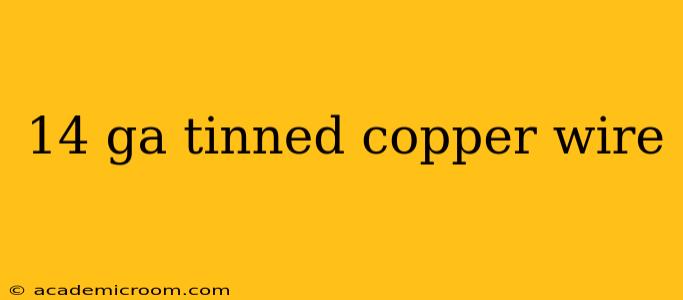14 gauge tinned copper wire is a common type of electrical wire used in a variety of applications. Understanding its properties and uses is crucial for both professionals and DIY enthusiasts. This guide delves into the specifics of 14 gauge tinned copper wire, addressing common questions and providing valuable insights.
What is 14 Gauge Tinned Copper Wire?
14 gauge tinned copper wire consists of a copper conductor coated with a thin layer of tin. The copper provides excellent electrical conductivity, while the tin coating offers several key advantages:
- Corrosion Resistance: Tin acts as a barrier against oxidation and corrosion, extending the lifespan of the wire, especially in damp or humid environments. This is crucial for outdoor applications or installations prone to moisture.
- Improved Solderability: The tin coating enhances solderability, making connections easier and more reliable. This is particularly important in applications requiring frequent soldering or repairs.
- Increased Durability: The tin layer adds a degree of physical protection to the copper core, making the wire more resistant to abrasion and damage during installation.
The "14 gauge" refers to the wire's diameter, with lower gauge numbers indicating thicker wires capable of carrying higher currents. 14 gauge wire is a versatile size suitable for a range of applications, as we'll discuss further.
What is 14 Gauge Wire Used For?
The versatility of 14 gauge tinned copper wire makes it suitable for numerous applications, including:
- Household Wiring: It's commonly used for circuits with moderate current demands, such as lighting fixtures, small appliances, and some power outlets. However, always check local electrical codes to ensure compliance.
- Automotive Wiring: Its corrosion resistance makes it a suitable choice for automotive applications, where exposure to moisture and vibration is common.
- Electronics Projects: In DIY electronics, 14 gauge wire is often used for connecting components and power supplies, especially where higher current carrying capacity is needed than smaller gauges.
- Grounding: Its conductivity makes it an effective choice for grounding wires, ensuring electrical safety.
Remember, it's crucial to choose the appropriate gauge wire for the specific application based on current carrying capacity to avoid overheating and potential fire hazards.
What is the Amperage of 14 Gauge Wire?
The amperage capacity of 14 gauge wire varies depending on factors such as insulation type, installation method, and ambient temperature. However, a general guideline is that 14 gauge wire can safely handle 15 amps in most residential applications. Consulting the National Electrical Code (NEC) or local electrical codes is paramount for accurate determination. Overloading the wire can lead to overheating and potential hazards.
What is the Difference Between Tinned and Untinned Copper Wire?
The primary difference lies in the tin coating. Untinned copper wire is more susceptible to corrosion and oxidation, making it less suitable for outdoor or damp environments. Tinned copper wire offers superior corrosion resistance, improved solderability, and enhanced durability. The choice between the two depends on the specific application and environmental conditions.
How Much Current Can 14 Gauge Tinned Copper Wire Carry?
As mentioned earlier, a general rule of thumb for 14 gauge wire is a 15-amp capacity in standard residential wiring. However, this is a guideline, and the actual safe amperage depends on several factors. Always consult the NEC or your local electrical codes for precise current carrying capacity information under your specific circumstances. Using a wire carrying more amperage than it's rated for can be dangerous and lead to fire hazards.
Is 14 Gauge Wire Suitable for Outdoor Use?
Yes, 14 gauge tinned copper wire is generally suitable for outdoor use due to its corrosion resistance. However, it's essential to select wire with insulation appropriate for outdoor conditions, such as UV-resistant materials. Always ensure the installation adheres to local electrical codes and safety regulations for outdoor wiring.
This comprehensive guide should provide a clearer understanding of 14 gauge tinned copper wire. Remember to always prioritize safety and consult relevant codes and regulations before undertaking any electrical work. If you're unsure about any aspect of electrical wiring, it's always best to consult a qualified electrician.
